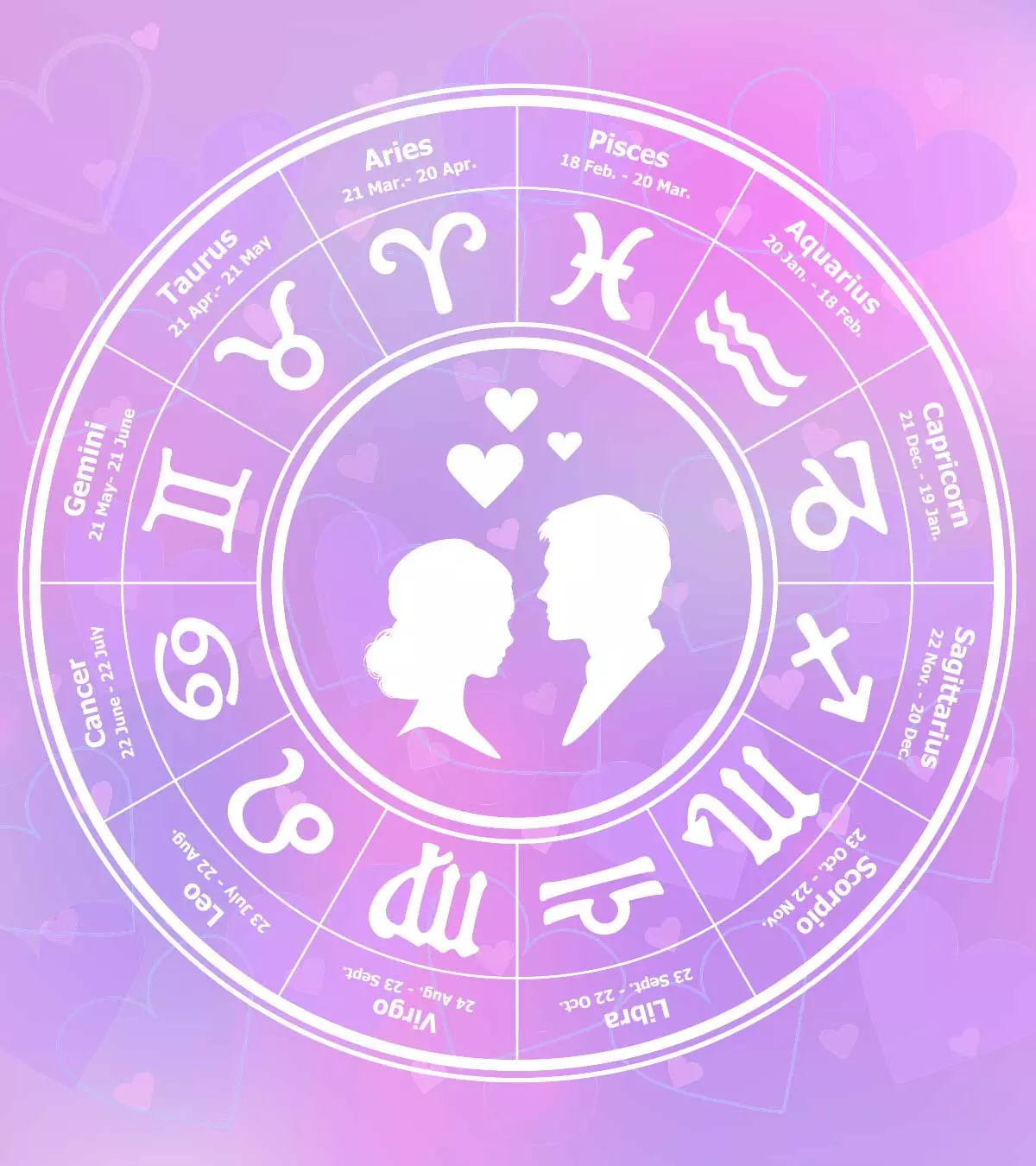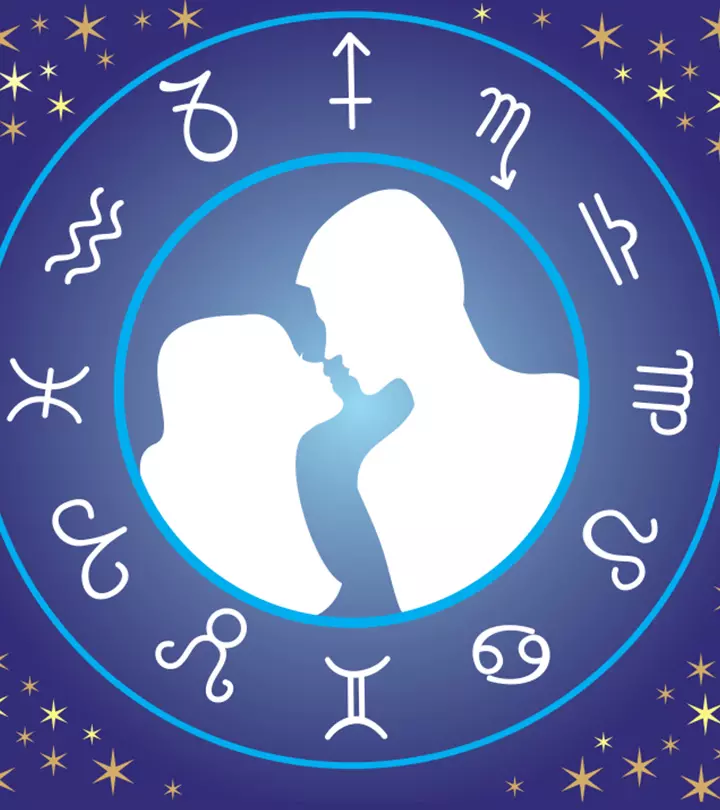
Image: Shutterstock
Love is a powerful emotion that gives rise to feelings such as crush, infatuation, passion, and attachment. However, at times it could be perplexing to differentiate between obsession vs love.
According to the Oxford Learner’s Dictionary, love can be defined as ‘a strong feeling of liking and caring for somebody or something, especially a member of your family or a friend, and obsession can be defined as ‘the state in which a person’s mind is completely filled with thoughts of one particular thing or person in a way that is not normal (1) (2). These meanings indicate a clear difference between the two feelings, but most of the time, it doesn’t take long for love to turn into an obsession.
Key Pointers
- Love is a strong sense of fondness, whereas obsession is the overflow of thoughts about a person or a preoccupation with a person.
- An obsessive person will rush you into things in a relationship, expect constant validation and are over-possessive.
- A person who’s in love with you will respect your boundaries and make an effort to keep you happy.
20 Differences Between Obsession And Love
Psychologist Ehab Youssef says, “Intense emotions can make obsession feel like deep love, but the key difference is that love is built on connection, trust, and respect, while obsession revolves around control, possession, and fear of loss.” If you feel your partner’s feelings for you are less of love and admiration and more of an obsession, look out for the following signs to be sure of their feelings.
1. They move fast in a relationship

When someone falls in love, they allow the relationship to bloom and flourish at its own pace. They will not rush to make it official, as they would want to see how the relationship develops. But someone obsessed with you will be afraid of losing you and insist on making your relationship official. Such behavior doesn’t constitute devotion and only shows their need to latch onto you.
2. They constantly do things for you
When in love, it is natural for your partner to pamper you and make you feel special occasionally. But when love becomes an obsession, your partner may constantly pamper you with gifts and surprises to keep you happy in a way that makes it difficult for you to abandon them. The supposed ‘acts of love’ are a bribe to keep you hooked in the relationship.
3. They seek frequent validation
It is normal for a partner to want to know what you feel about them. But if your partner often asks you what you think about them and seeks validation from you, it shows their obsessive-love tendency. It could be because they have been hurt in love before and see you as a prized possession that has to be protected at all cost. They seek frequent validation to ensure that their place in your life is secure.
4. They display extreme possessiveness
This is one of the clearest signs of a clingy girlfriend or boyfriend. Relationship counselor Julie Tenner opines, “In my clinical and coaching work, I often see behaviors mistaken for love that are actually signs of obsession. Possessiveness is often misread as passion—wanting to know where someone is, who they’re with, and what they’re doing isn’t love; it’s control disguised as desire.” Initially, you might find it endearing to see your partner go green with envy whenever they see you with another person. A little possessiveness is a part of love. But if your partner starts snooping on you, checks your phone, and gets angry when you speak to another person, it shows their over-possessiveness. They are so afraid of losing you that they consider every other person a competition—that’s an obsession and not love. Possessiveness is often followed by the partner’s need to exercise control over you. Over time, the gestures you feel romantic today can turn into controlling behavior (3).
5. They insist on keeping in contact almost all the time

Research indicates that in the early stages of love, people tend to fixate on minor details, spending hours analyzing or deliberating over a single text sent to or received from their partner (4). It’s cute when your partner sticks with you at the beginning of a relationship. But what if your partner wants to maintain constant chat sessions even after months of dating? The constant need to be around or to text or call is an obsession because it shows that they think about you all day long. Such kind of attachment is unhealthy for both partners.
6. They control every aspect of your life
Obsessive love is seldom about love and more about owning and possessing another person (5). It is okay for a couple to seek each other’s opinions and advice on various matters. But if your partner is the sole decision-maker and decides everything for you, it is indicative of a controlling boyfriend or girlfriend. That’s not love, and they want to control you and your life.
7. They demand to know your whereabouts
Call it love and care when you are working late, and your partner calls to check on you. But if they call you frequently, even when they know you are out with your friends, it is an obsession. They want to keep a tab on you and even feel upset when you fail to answer them. They check on you more out of addiction and less out of care. And this is one of the main differences between obsession and love.
 Point to consider
Point to consider8. They cannot stop thinking about you
It is normal for a partner to ask you how your day was and express their fondness for you and how much they miss you. But if they start thinking about you the whole day, wondering where you are and what you must be doing, it means they are obsessed with you.
This intense feeling and obsessive behavior is not unknown to Clara Bridges, a blogger who writes on wellness and shares her recovery journey of Borderline Personality Disorder in her blog. Narrating a personal experience, she says, “When I’m in this phase of an obsessive attachment, the other person becomes my entire world. They are my first thought upon waking and my last thought at night. They are a place (either in reality or in my head) that I escape to constantly and willingly, losing myself in every conceivable way (i).”
9. They stalk you online and even in real life

If your partner ever appears outside your office without informing you, it means they love you and like to surprise you. But if your partner often visits your office unannounced and even frequents the place to keep an eye on you, they are obsessed with you. They might even stalk you online and get angry when someone from the other sex likes or comments on your pictures or posts.
10. They may not share your happiness
Suppose you are asked to visit another city to give a speech and receive an award, a loving partner will be happy and encourage you to give your best speech ever. On the other hand, an obsessive partner will be less concerned about your speech and more worried, thinking you might meet someone and fall in love. They might even insist on accompanying you on your official trips.
11. They refrain from sharing genuine opinions
When in love, partners are not afraid of speaking their minds and sharing opinions. But a partner obsessed with you will only tell you things that will please you. They will even sugarcoat opinions to make you happy. For instance, when you suggest eating at a restaurant, and they dislike the venue, instead of voicing their preference, they will agree to go just to keep you happy. Over time, this lack of honest communication can erode the foundation of trust in your relationship. Honesty is one of the foundation stones of a relationship. If that is missing, then your relationship is far from ideal.
12. They guilt-trip you for their benefit

It is normal for people to break up when they realize they are not compatible as a couple. But an obsessive lover does not know how to handle rejection. Tell them you want a break from them, and they will throw a fit. Ask them to break up with you, and they will threaten you, saying they’ll harm themselves if you ever decide to leave them. It is not easy to escape their obsessive love.
13. They promise to change their behavior
If you tell your obsessive partner you are tired of their behavior, they might probably promise to change themselves. They will swear to give up obsessing over you and might even keep their word for some time to keep you from leaving. But eventually, they might get back to their old ways.
14. They neglect their family and friends for you
When someone gets into a romantic relationship, it is natural for them to focus on it and temporarily ignore people who matter to them. Such a behavior lasts for some time and then gets back to normal. But it does not happen with an obsessive partner. They start ignoring people close to them to focus on you and never really get back to them. Slowly, they lose all their friends and even limit interaction with their family as their focus on you is what matters. Losing oneself for the partner is an obsession and not love.
15. They stop you from spending time with your loved ones
If your partner truly loves you, they will never refrain from meeting your loved ones. They do not feel threatened if you choose to spend time with your friends and family over them. But the one who obsesses over you is suspicious and wants you to be with them all the time. They will forbid you from meeting your family and friends and instead make plans to spend time with them. Tenner says, “Another red flag of obsession is when your world revolves entirely around them, making you fade into the background. Love should add, not consume. If you’re losing touch with friends, hobbies, or yourself in the name of love, it’s not love—it’s obsession.”
16. They abuse you physically and verbally

The United Nations defines domestic abuse as “…a pattern of behavior in any relationship that is used to gain or maintain power and control over an intimate partner (6).” A true love relationship has no place for physical or verbal abuse. Even if both partners disagree over something, no one uses any force to have their way. But an obsessive lover cannot stand an objection. They will want you to conform to their wishes and exert pressure to make you yield. They will justify their actions by saying that either they were left with no choice or they did it for your good.
17. They do not trust you
In love, your partner trusts you whole-heartedly. They know that no matter how much time you spend away from them, you will always come back to them. Trust is absent in an obsessive relationship. No matter how much you assure them through words and actions, they will not have faith in you. They will always ask you for details of your whereabouts and might even want proof. For example, if you travel for work, a loving partner will trust you and wait to hear about your experiences upon your return. An obsessive partner, in contrast, may demand constant updates, asking for photos to prove where you are or scrutinizing your phone for messages.
18. They are only concerned with their needs
Love is a two-way street where you and your partner ensure that your needs are fulfilled, and you both are happy. But an obsessive partner is only concerned with satisfying their needs. They do not care if the relationship makes you sick. All they want is control over you to have their way with you. For instance, when you feel tired after coming home from work and need time to relax, a loving partner will understand and give you space. An obsessive partner, on the other hand, might disregard your feelings and insist that you spend time with them regardless of your well-being.
19. They put conditions on you
Love gives you freedom. A partner who loves you will never want to tie you down and will instead encourage you to chase your dreams and ambitions. A partner who is obsessed with you will shackle you with numerous conditions. They will hardly give you any choice and will bound you by time, place, and other elements. For example, if you get an opportunity to study abroad or pursue a career abroad, a supportive partner would encourage you to follow your ambitions, while an obsessive partner will impose restrictions on you. An obsessive partner will forbid you from traveling alone or demand constant check-ins. They may even say something like, “If you really love me, you won’t go.”
20. They make you feel suffocated in the relationship
A couple in love always has respect for each other throughout their relationship. If your partner obsesses over you, your respect for them will erode gradually and might be replaced with anger and fear. For example, they might demand to spend every waking moment together and dismiss your need for personal time. Over time, their behavior might make you feel fearful as you might feel concerned about triggering their anger. Fear is especially prominent where there is any abuse involved. You start feeling trapped and wish to set free from them.
What Causes Obsessive Love?
Obsessive love is when someone feels an overwhelming, intense love that may come across as unhealthy. It often starts with a strong attraction and can grow into an excessive need for affection and attention from the loved one. The following are some reasons behind obsessive love.
1. Attachment disorder: The seeds for an adult’s personality are sown in their early childhood. If a child has gone through traumatic experiences in childhood, involving abandonment, it can lead to an insecure attachment style. Individuals who have an insecure attachment style are likely to develop obsessive tendencies in romantic relationships. Research indicates that there is a strong relationship between attachment styles and obsessive love, suggesting that insecure attachment may make individuals prone to obsessive behaviors (7).
2. Borderline Personality Disorder (BPD): Individuals with BPD experience intense fears of abandonment (8). Such individuals are most likely to exhibit obsessive behaviors towards their partners as they fear rejection. Hence, they tend to enter into intense relationships and struggle to control their emotions.
3. Relationship Obsessive–Compulsive Disorder (ROCD): ROCD is a condition that causes intrusive thoughts and compulsive behaviors centered around relationship-related concerns. Individuals with this condition often tend to doubt their partner or the validity of their relationship. A study highlights ROCD’s interference with relational and sexual functioning, emphasizing the disorder’s impact on individuals’ lives (9).
How To Deal With Obsessive Love?
Dealing with obsessive love can be challenging as it involves intense emotions and deep attachments. Here are some ways in which you can deal with this situation.
- Acknowledge the signs: Firstly, acknowledge the fact that what you perceive as love is obsession. It may be difficult for you, but when you see the signs in your partner, know that their love has turned into an obsession.
- Set boundaries: When you are sure that your partner is obsessed with you, calmly tell them to respect your space and avoid intrusive actions like excessive texting or monitoring all your activities.
- Support their hobbies: Encourage your partner to pursue their own hobbies. This will help them focus on something else rather than obsessing over you.
- Reassure your partner: Your partner’s obsession probably stems from a deep insecurity. So, assure them of your love and commitment, and acknowledge their feelings without being judgmental.
- Be firm but compassionate: Firmly address concerning behaviors, such as excessive jealousy or constant surveillance, but remain empathetic to their emotions.
- Avoid feeding their obsession: Try not to be too dependent on your partner, as your need for their validation or approval can make them fixated on you. Let them have a life of their own.
- Seek professional help: If nothing seems to work, seek the guidance of a professional counselor to identify the root cause of your partner’s obsession and address the problem in the most effective way possible.
Frequently Asked Questions
1. Can love be one-sided, or is that always an obsession?
Love becomes an obsession when a person cannot think beyond their object of affection. In one-sided love, a person may harbor affection for a person for years but still not be consumed by it in an unhealthy manner.
2. Can an obsession be healthy in a relationship?
Obsession of any kind is not healthy for a relationship. It can suffocate a person and erode the connection from within.
3. What are the dangers of confusing obsession with love?
When an obsession is confused with love, a person becomes susceptible to long-term abuse, loss of individualism, and lack of space and liberty. Yet, they mistake obsessive behavior for love and put up with it without complaints.
4. How does obsession impact the ability to have a healthy, long-term relationship?
Obsession causes a disbalance in a relationship as the reins of the relationship is in one person’s hands. The other person is left with no freedom, which eventually affects them mentally and physically, making it toxic for both partners.
5. Is it possible for an obsession to develop after years of being in a loving relationship?
Obsessive love is not identified as a medical condition. However, obsession could be an indicator of an underlying mental issue. It is possible that a sudden mental ailment could make the person obsessive about their partner years after being in a relationship.
6. Can obsession in a relationship ever be considered a positive thing?
No, obsession of any kind is not good, let alone obsession in love or a relationship.
7. What are some coping strategies for managing obsessive feelings?
Consider talking to a therapist who can offer support and help you deal with underlying problems. You may also do well by establishing personal boundaries. Also, take care of yourself through activities like exercises, hobbies, or mindfulness to improve your overall well-being.
Love is a powerful emotion that’s often confused with obsession. In the battle between obsession vs. love, if obsession overpowers love, it becomes a toxic relationship. Although obsession isn’t always bad, it often makes a relationship suffocating and toxic. Thus, understanding this red flag is vital to identify if you are in a healthy relationship or not. Constantly seeking validation, always doing things for you, displaying extreme possessiveness, and putting conditions for the relationship are a few clear signs that your partner is obsessed with you. If you think your partner is obsessive, sit down with them and have a frank conversation. Do not hesitate to seek professional help if required.
Infographic: Ways To Avoid Obsession In A Relationship
Obsession is toxic for both partners. It blurs reasonable explanations and feeds into your insecurity, ultimately leading to hate for one another. So if the above signs are similar to what is happening in your relationship, learn how to deal with the obsession for a hopeful future with your partner.

Illustration: Momjunction Design Team
Illustration: Love Vs Obsession: 20 Main Differences

Image: Stable Diffusion/MomJunction Design Team
Discover the 5 key differences between love and obsession in this video! Learn how to tell if your feelings are real or if you’re just infatuated.
Personal Experience: Source
MomJunction articles include first-hand experiences to provide you with better insights through real-life narratives. Here are the sources of personal accounts referenced in this article.
i. Waiting to fall – BPD and obsessive attachments;https://lifeinabind.com/2014/06/21/waiting-to-fall-bpd-and-obsessive-attachments/
References
- Love; Oxford Learner’s Dictionary
https://www.oxfordlearnersdictionaries.com/definition/english/love_1 - Obsession; Oxford Learner’s Dictionary
https://www.oxfordlearnersdictionaries.com/definition/english/obsession?q=obsession - Possessiveness: The Precursor to Power and Control.
https://www.domesticshelters.org/articles/identifying-abuse/possessiveness-the-precursor-to-power-and-control - What happens in your brain when you’re in love?
https://www.apa.org/topics/marriage-relationships/brain-on-love - The Obsessive Love Wheel.
https://aspencenter.org/your-guide-to-understanding-obsessive-love/ - What Is Domestic Abuse?
https://www.un.org/en/coronavirus/what-is-domestic-abuse - Sajid Iqbal Alyana et al.; (2023); Insecure Attachment Styles and Obsessive Love Among Emerging Adults.
https://www.researchgate.net/publication/381010064_INSECURE_ATTACHMENT_STYLES_AND_OBSESSIVE_LOVE_AMONG_EMERGING_ADULTS - Borderline Personality Disorder.
https://www.nimh.nih.gov/health/publications/borderline-personality-disorder - Guy Doron et al.; (2016); Relationship Obsessive–Compulsive Disorder: Interference, Symptoms, and Maladaptive Beliefs.
https://pmc.ncbi.nlm.nih.gov/articles/PMC4834420/
Community Experiences
Join the conversation and become a part of our nurturing community! Share your stories, experiences, and insights to connect with fellow parents.
Read full bio of Ashley Cairns

Julie Tenner is an intimacy & relationship therapist, counsellor, author, speaker, and co-host of the Nourishing the Mother podcast. With over 20 years of expertise in couples therapy, trauma healing, and somatic intimacy work, she helps long-term couples and women escape cycles of stagnation and rediscover the magnetic pull of connection, passion, and desire. A mother of four and specialist in sex, polarity, and trauma-informed healing, Julie understands the complexities of balancing love, family, and self. Through her coaching, speaking, and wildly popular podcast with over a million downloads, she is a trusted voice in modern relationships
Julie Tenner is an intimacy & relationship therapist, counsellor, author, speaker, and co-host of the Nourishing the Mother podcast. With over 20 years of expertise in couples therapy, trauma healing, and somatic intimacy work, she helps long-term couples and women escape cycles of stagnation and rediscover the magnetic pull of connection, passion, and desire. A mother of four and specialist in sex, polarity, and trauma-informed healing, Julie understands the complexities of balancing love, family, and self. Through her coaching, speaking, and wildly popular podcast with over a million downloads, she is a trusted voice in modern relationships
- Ehab Youssef is a licensed clinical psychologist, mental health researcher and writer at Mentalyc. He has done MSc in Psychology at the University of Groningen and worked as a psychotherapist in Luxembourg and Cairo. Ehab currently works as a psychology AI researcher at Mentalyc, where he applies his expertise in psychology and artificial intelligence to develop innovative solutions for mental health care.
 Ehab Youssef is a licensed clinical psychologist, mental health researcher and writer at Mentalyc. He has done MSc in Psychology at the University of Groningen and worked as a psychotherapist in Luxembourg and Cairo. Ehab currently works as a psychology AI researcher at Mentalyc, where he applies his expertise in psychology and artificial intelligence to develop innovative solutions for mental health care.
Ehab Youssef is a licensed clinical psychologist, mental health researcher and writer at Mentalyc. He has done MSc in Psychology at the University of Groningen and worked as a psychotherapist in Luxembourg and Cairo. Ehab currently works as a psychology AI researcher at Mentalyc, where he applies his expertise in psychology and artificial intelligence to develop innovative solutions for mental health care.
Read full bio of Ratika Pai
Read full bio of Akshay Nair
Read full bio of Benidamika J Latam


















